 Petzlover
Petzlover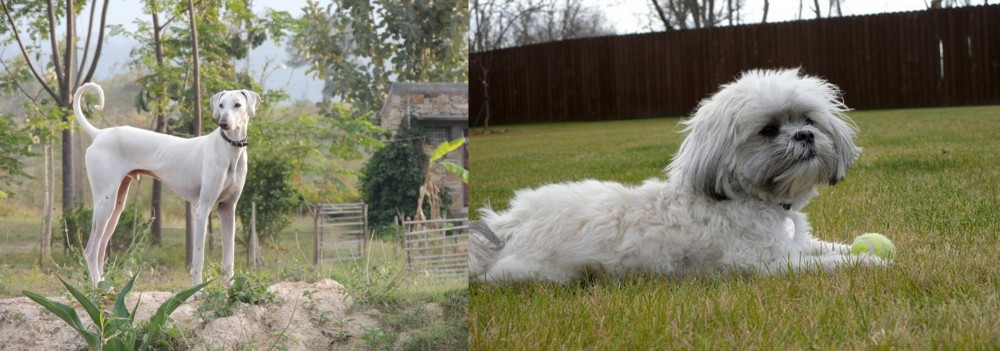 Chippiparai is originated from India but Mal-Shi is originated from United States. Chippiparai may grow 33 cm / 13 inches higher than Mal-Shi. Chippiparai may weigh 13 kg / 29 pounds more than Mal-Shi. Both Chippiparai and Mal-Shi has same life span. Both Chippiparai and Mal-Shi has almost same litter size. Chippiparai requires Low Maintenance. But Mal-Shi requires Moderate Maintenance
Chippiparai is originated from India but Mal-Shi is originated from United States. Chippiparai may grow 33 cm / 13 inches higher than Mal-Shi. Chippiparai may weigh 13 kg / 29 pounds more than Mal-Shi. Both Chippiparai and Mal-Shi has same life span. Both Chippiparai and Mal-Shi has almost same litter size. Chippiparai requires Low Maintenance. But Mal-Shi requires Moderate Maintenance
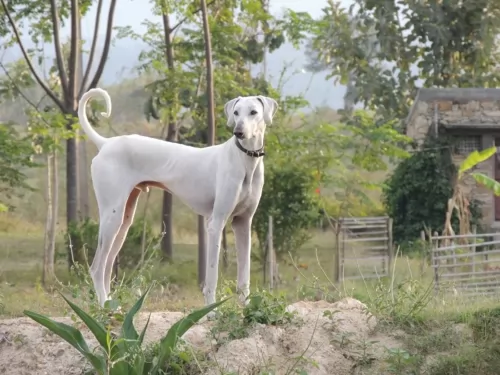 The Chippiparai is a working dog found in India and until recently there has been little interest in the purity of any breed, but rather only an emphasis on the abilities of the dog. They are only beginning to research the origin and history of their native dogs such as the Chippiparai. Not much is known about the origin of the breed except that it is found almost exclusively in Tamil Nadu and Keraia in the southern part of the subcontinent of India. Other than this there is much speculation about the breed’s origin but very little-known facts. It is indeed an ancient breed; however, its origin could be thousands of years ago or simply hundreds of years ago.
The Chippiparai is a working dog found in India and until recently there has been little interest in the purity of any breed, but rather only an emphasis on the abilities of the dog. They are only beginning to research the origin and history of their native dogs such as the Chippiparai. Not much is known about the origin of the breed except that it is found almost exclusively in Tamil Nadu and Keraia in the southern part of the subcontinent of India. Other than this there is much speculation about the breed’s origin but very little-known facts. It is indeed an ancient breed; however, its origin could be thousands of years ago or simply hundreds of years ago.
• Perhaps it is a descendant of the Saluki as it resembles this breed quite a bit. It has been believed for some time that the Saluki is the original sighthound and the source of all sighthound breeds. The Saluki was very popular in the Middle East, especially in Persia and Arabia from which it could easily have spread to India. It would then have been shared from Northern India to Southern India where the Chippiparai is found.
• Perhaps the Chippiparai is a descendent of sighthounds from Central Asia and Afghanistan – the Tazi, Taigan, Hortaya Borsaya or the Afghan Hound. This part of Central Asia had more trade, influence and contact with the Indian subcontinent early in their history than with any other region. The Chippiparai is considered by some to be more like these sighthounds than like the Saluki and the interaction between these regions has a much longer history than the Middle East and India.
• It is also speculated that the Chippiparai might have been developed completely and uniquely from the local street and working dogs. With the civilization of India being one of the oldest in the world, it is considered a possibility that the Chippiparai is the descendent of the Harappan hunting dogs that probably were developed by the Indus Valley or Harappa roiling class.
Wherever the Chippiparai came from, they were the exclusive property of the wealthy and ruling castes. These upper castes were the only ones that could legally hunt with dogs or afford to feed one. The royal classes of Tiruneivell, Thanjavur, and Madurai all fed the popularity of the breed among the upper castes. They were coursing dogs used to chase down the prey once it was sighted. The Chippiparai are incredibly fast runners and would catch almost any prey and either hold it or kill it for their hunter. The Chippiparai, when not hunting, had to be chained so they would not chase any small animal that they saw. This confinement also added to the purity of the breed as random breeding was prevented.
The southern part of the Indian subcontinent is extremely hot with routine temperatures over 100’. The Chippiparai was developed to withstand these extreme temperatures and is more heat tolerant than most any other breed. They also need very little food and are resistant to the many parasites and diseases found in southern India.
Harboring the belief that Indian dogs were not as good as European ones, the occupying countries of Portugal, France, and Britain, had no interest in the Chippiparai, again leaving the breed to develop naturally on their own with little or no interbreeding. They also received no formal recognition because Indian culture only valued the dog for its working abilities. There was no Indian Kennel Club until 1956.
The Chippiparai is now very rarely and only found in the area of its birth. Many believe the breed is in danger of becoming extinct and even though it is now registered with Indian Kennel Clubs it is not often shown in their dog shows. Lovers of the breed are now attempting to get Indians to recognize that the Chippiparai is a great companion animal and attempting to save the breed.
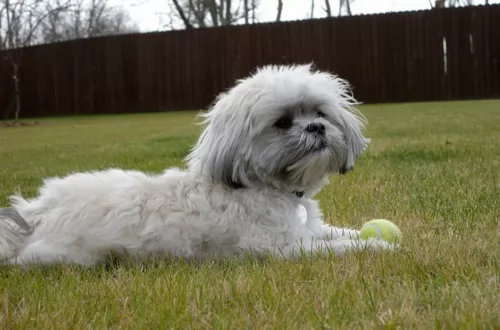 Small and pretty, the Mal-shi is a new crossbreed dog which originated in the United States and only recently - in the 1990s.
Small and pretty, the Mal-shi is a new crossbreed dog which originated in the United States and only recently - in the 1990s.
There hasn’t been much interest shown in developing this small dog into an independent breed, so most of these dogs are regarded as crosses from the two parent breeds – the Maltese Poodle and the ShihTzu.
Known as a designer dog he was also bred to be a low shedder. No breed clubs for this dog have been established and there are no breed standards either.
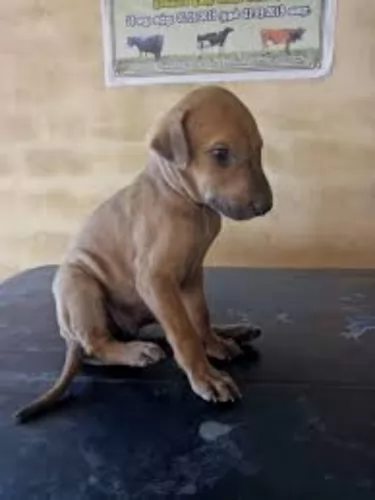 The Chippiparai is a typical sighthound although their size and appearance will vary more than that of registered purebred sighthounds. Typically, they will have a long, domed head with small erect ears and dark eyes. Their muzzle will be as deep and wide as the skull but longer. Their legs are straight and long, their chest is roached back and deep, giving them, an appearance very similar to a greyhound or other sighthound.
The Chippiparai is a typical sighthound although their size and appearance will vary more than that of registered purebred sighthounds. Typically, they will have a long, domed head with small erect ears and dark eyes. Their muzzle will be as deep and wide as the skull but longer. Their legs are straight and long, their chest is roached back and deep, giving them, an appearance very similar to a greyhound or other sighthound.
They have a long curly tail, and their coat can vary greatly in color. They are medium sized, and their coat is short, shiny and close. He is very slender and sleek, which along with his long legs gives him that incredible speed. They are thin with visible ribs.
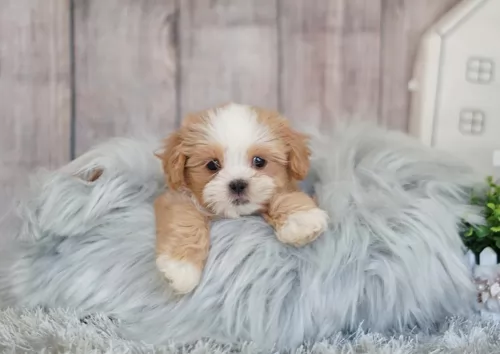 The Mal-Shi is a small dog standing at around 25–30 cm in height and weighing between 3 and 7kg. As a designer dog he has a low-shedding coat of many colors – white, black and white, white and apricot and brown.
The Mal-Shi is a small dog standing at around 25–30 cm in height and weighing between 3 and 7kg. As a designer dog he has a low-shedding coat of many colors – white, black and white, white and apricot and brown.
The coat is usually soft and silky and slightly wavy and it can grow long if left untrimmed. Most people take their pets to a professional groomer to be cut.
The skull of the dog is domed, he has small ears which can be half-erect and half-floppy.The tail is long and fairly feathery. Sometimes the dog inherits the underdeveloped tear duct of the Maltese and then there is that usual tear-staining around the eyes.
THE Mal-Si is such a cute little dog, making him a splendid pet for children and he is more than happy to be cuddled and petted. Small and active, he is adaptable and will live easily in the city or the countryside, as his exercise needs aren’t that demanding. He basically requires a walk each day and will love some ball games both inside and outdoors.
He is an extrovert and also an entertainer, and his amicable nature allows him to get along with other pets in the home. However, contrary to what he looks like, he is a bold dog, social and also intelligent, making him easy to train.
It is to any owner’s advantage to have a little dog like this trained and socialized, even though he is so good natured. He makes a great therapy dog too. When the Mal-Shi is at home he’s an affectionate, loving dog who just wants to spend time in the company of his human family.
As a companion dog, he won’t do well when left for hours on end on his own. Dogs are social creatures, and they can battle with separation anxiety when left alone for too long. Every dog owner needs to think of this before investing in a dog.
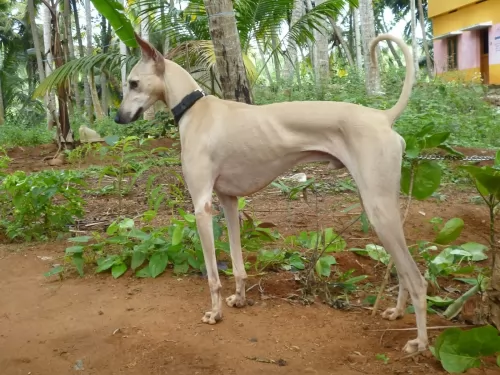 The Chippiparai is a loving, gentle family dog if well socialized, well trained and well exercised. They are very intelligent and need human companionship. Once they are living with a human family, they are very protective of that family. They are for the most part peaceful and quiet dogs. They are loyal and loving but they are not overly affectionate. Cuddlers they are not, and they do not like to play rough with children.
The Chippiparai is a loving, gentle family dog if well socialized, well trained and well exercised. They are very intelligent and need human companionship. Once they are living with a human family, they are very protective of that family. They are for the most part peaceful and quiet dogs. They are loyal and loving but they are not overly affectionate. Cuddlers they are not, and they do not like to play rough with children.
Accepting and loving within the family, the Chippiparai are equally hesitant and shy around strangers. They can be suspicious, but they are not aggressive. They are just very aloof with strangers, yet they hardly ever bark.
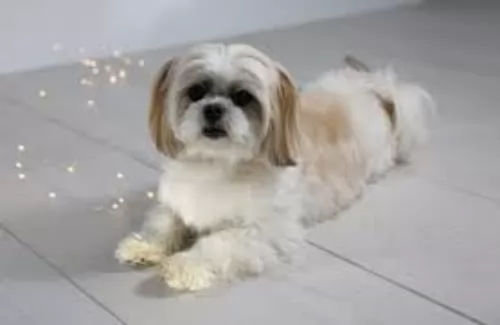 The Maltese Shih Tzu is an attractive little dog who is guaranteed to make you a splendid pet. Those who have owned both Maltese and Maltese Shih Tzu will tell you that the temperament of this dog is more amicable than that of the Maltese.
The Maltese Shih Tzu is an attractive little dog who is guaranteed to make you a splendid pet. Those who have owned both Maltese and Maltese Shih Tzu will tell you that the temperament of this dog is more amicable than that of the Maltese.
With his amicable nature, he is willing to be everyone’s friend, and he makes a particularly good choice for elderly people.
Being such a people-dog, the Maltese Shih Tzu's greatest joy comes from being petted and taken notice of by his human family. He can’t bear to be left for long periods of time. Like any other dog, he will require training and socialization, requiring a firm, balanced, consistent, fair owner.
Cheerful and good-natured, when he is loved to the moon and back, this little dog promises to make you and exceptional best friend.
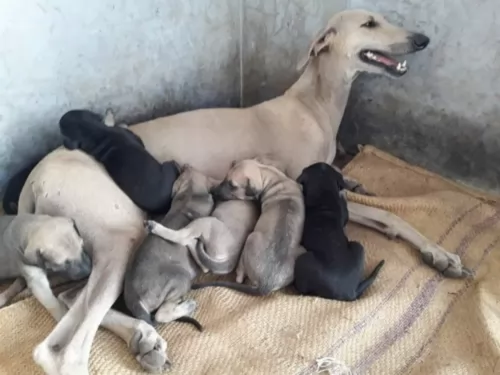 There are no clinical studies regarding the health and health history of the Chippiparai, so little is known about their long-term health. However, most who know the breed, believe it is an incredibly healthy one. They seem to have a lot less genetically transmitted health issues than other purebreds. Because of their isolation for centuries in India, they have developed immunities and resistance to most parasites and diseases other dog suffer from.
There are no clinical studies regarding the health and health history of the Chippiparai, so little is known about their long-term health. However, most who know the breed, believe it is an incredibly healthy one. They seem to have a lot less genetically transmitted health issues than other purebreds. Because of their isolation for centuries in India, they have developed immunities and resistance to most parasites and diseases other dog suffer from.
Because of this you should look for the types of issues that occur in dogs of this size and build. Have them tested by the Canine Eye Registration Foundation and the Orthopedic Foundation for Animals.
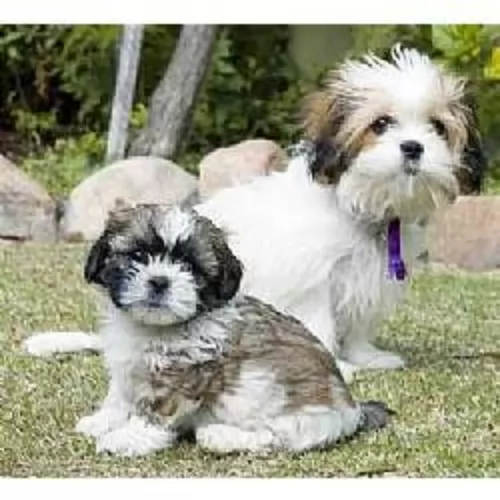 The Maltese Shih Tzu is a robust little dog, and with good care he can live to be anything between 10 to 15 years of age.
The Maltese Shih Tzu is a robust little dog, and with good care he can live to be anything between 10 to 15 years of age.
There are some health issues you want to be aware of with this particular dog breed.
Your little canine friend can have respiratory problems because of him being a flat-faced breed. Known as brachycephalic dogs, these dogs can have breathing difficulties. They are usually fine when resting, but during exercise or if they become too hot, they battle with breathing. It makes them more prone to heatstroke, so it is important to keep dogs like this cool and calm.
This is actually a common problem in small dogs - dislocation of a bone at a joint. Patellar luxation is when the knee joint slides in and out of place, causing pain.
This is a disease which is seen in the Shih Tzu and Maltese. Symptoms include uncontrollable shaking and tremors. These can continue all day. The illness is worse during times of stress and there may even be difficulty with walking. The cause is unknown but he will certainly need to get to the vet.
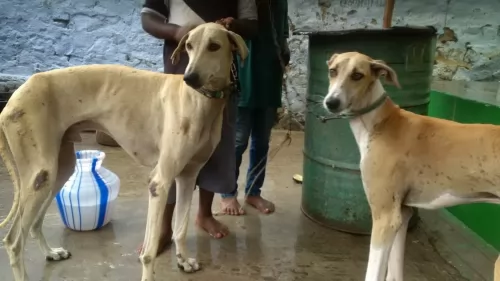 Do not overfeed your Chippiparai. Feed twice a day and no more than a total of 2.5 cups of high quality dry food.
Do not overfeed your Chippiparai. Feed twice a day and no more than a total of 2.5 cups of high quality dry food.
As mentioned previously the Chippiparai seems to have no genetic diseases or issues and very few acquired ones. However, he is sensitive to anesthesia and some foods. He is intolerant to cold weather and has a hard time with his pads on hard surfaces. Some Chippiparai might experience some of the ailments other breeds like them experience.
Both Elbow and hip are possible. This can cause arthritis and lameness. This occurs when the bone does not fit well into the joint.
This can cause lameness as well. The kneecaps slide over the knee instead of staying in place.
This is a hunting dog and he will want to hunt. They are incredibly fast and need the opportunity to run. Brisk walks will not be enough for this dog. He is very energetic. They will chase any small animals. It is not recommended that you have small pets even small dogs or cats with a Chippiparai. Having been bred for centuries to hunt, they are not likely to respond to any commands if they are off lease and chasing prey. Do not allow them to be off leash unless in a fenced area, and that fence needs to be 8 feet tall as they can easily jump a seven-foot fence. Try they at coursing, agility, fly ball and frisbee competitions.
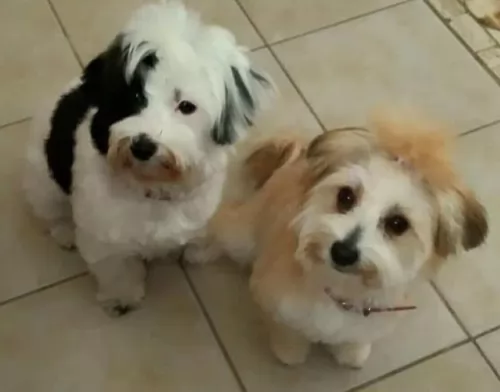 The Mal-Shi is a small dog and will require eating two small meals a day. An adult Mal-Shi will eat according to his age, size and activity levels.The quality of the dog food you buy will make a huge difference to his wellbeing. The better quality foods – those without preservatives, colorants and fillers will ensure good health and longevity for your pet.
The Mal-Shi is a small dog and will require eating two small meals a day. An adult Mal-Shi will eat according to his age, size and activity levels.The quality of the dog food you buy will make a huge difference to his wellbeing. The better quality foods – those without preservatives, colorants and fillers will ensure good health and longevity for your pet.
Don’t just give him dry kibble every time – mix in some chopped up cooked chicken, brown rice and vegetables. Remember that some vegetables like onion can be bad for your pet.
Dogs love simplicity, and feeding your dog these simple foods will ensure you don’t battle with upset stomachs. Make sure you always have a bowl of fresh, cool water available for your pet.
Trim his nails when they get long and don’t wear down naturally.
Check his ears for redness, itchiness and discharge which could indicate an ear infection.
If you have him professionally groomed, you will still need to brush him twice a week. It’s also your time to check him over for ticks and fleas and any unusual lumps.